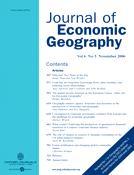-
Views
-
Cite
Cite
Paul Plummer, Eric Sheppard, Geography matters: agency, structures and dynamics at the intersection of economics and geography, Journal of Economic Geography, Volume 6, Issue 5, November 2006, Pages 619–637, https://doi.org/10.1093/jeg/lbl005
Close - Share Icon Share
Abstract
Contemporary debates in economic geography are characterized by a lack of agreement with respect to both those aspects of the evolving economic landscape that call for explanation and what constitutes an adequate explanation of geographical reality. We articulate a distinctively geographical approach to modeling processes of regional growth and change. The evolving economic landscape is conceptualized as a ‘going concern’, characterized by complex dynamic interdependencies between the agents and structures that constitute spatial economic systems. At any moment in time, interdependencies between agents are constrained by social and spatial structure, but over time structure and agency are mutually constituted: a socio-spatial dialectic. We contend that the complex interdependence between agents, structures and dynamics increases the likelihood of persistent non-equilibrium space-time trajectories. We conclude that questions of conceptual and epistemological adequacy in economic geography cannot be resolved in favor of any single ‘best’ approach, and argue that debates should move away from competing monist accounts, towards critically engaged pluralism.



